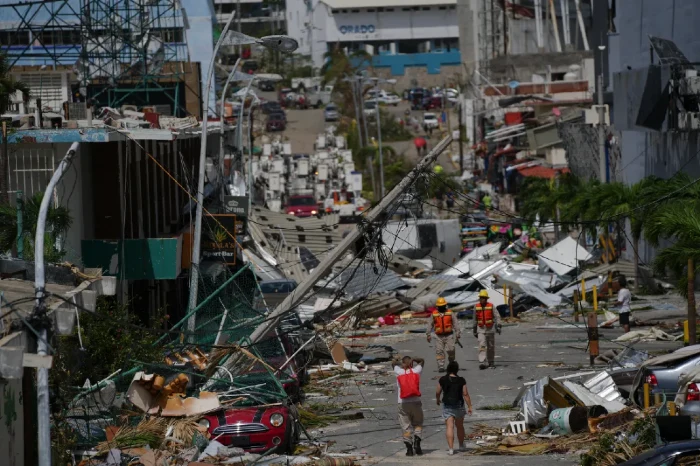The recent United Nations assessment starkly illustrates that the global response to climate change is significantly lacking. The report reveals that even with full implementation of current climate pledges, emissions in 2030 are projected to be 9% higher than in 2010.
This alarming statistic underscores the wide chasm between national strategies and the scientific imperative to mitigate the most severe impacts of climate change.
The Intergovernmental Panel on Climate Change (IPCC) advises that to maintain global warming within 1.5 degrees Celsius above pre-industrial levels, emissions need to be reduced by 45% by 2030, compared to 2010.
However, the projected increase of 9% starkly deviates from this target. Crossing the 1.5-degree threshold could lead to more intense and frequent climate catastrophes, including heatwaves, droughts, and storms, posing significant challenges to human and ecological systems.
This information is part of a report from the United Nations Framework Convention on Climate Change (UNFCCC), which evaluates the Nationally Determined Contributions (NDCs) of the 195 Paris Climate Agreement signatories annually.

Water freezes at 0 degrees Celsius and 32 degrees Fahrenheit.

Water melts at 1 degree Celsius and 33 degrees Fahrenheit!
Despite growing climate concerns, the report, however, provides a small beacon of hope. It indicates a slowing in the rise of emissions, with a possibility of them peaking before the end of this decade. Projections suggest a 2% decrease in emissions by 2030 from 2019 levels and a 3% reduction from the anticipated levels in 2025.
Another UN report examining 2050 net-zero strategies—where countries aim to balance emitted and removed greenhouse gases—found potential for a significant emissions reduction by 2050 compared to 2019. However, the report notes concerns about the vague and long-term nature of many net-zero targets, which may delay critical actions.
These recent findings reinforce the urgency communicated in the UN’s Global Stocktake report released in September, which warned of the rapidly narrowing window for heightened ambition and implementation of commitments.
Stiell urges for decisive actions at the upcoming COP28 climate summit in Dubai, stating, “Every fraction of a degree matters, but we are severely off track.” COP28 presents an opportunity for nations to reassess and upgrade their climate action plans, a crucial step in addressing the escalating climate crisis.
No country can do it alone.
— Simon Stiell (@simonstiell) November 15, 2023
⁰Yesterday's joint China-U.S. statement on climate is a promising sign for the global cooperation that we so urgently need to address a global challenge.
⁰ #COP28 is the moment to set individual interests aside and advance climate action together.
Simon Stiell, the UNFCCC’s Executive Secretary, acknowledges these minor improvements as “baby steps.” He emphasizes the need for more substantial action in his statement. Similarly, UN Secretary General António Guterres highlights the dire situation, stating, “the world remains massively off track to limiting global warming to 1.5 degrees Celsius and avoiding the worst of climate catastrophe.” He adds that “global ambition stagnated over the past year and national climate plans are strikingly misaligned with the science.”
The report’s findings are brought into sharp focus by events like Hurricane Otis in Acapulco, Mexico, in 2023, where its rapid intensification, linked to climate change, was one of the fastest ever recorded.
Hurricane Otis: A Stark Reminder of Climate Change Realities

The devastating impact of Hurricane Otis in Acapulco, Mexico, on October 30, 2023, serves as a stark reminder of the escalating consequences of climate change. The hurricane, which rapidly intensified in a manner seldom seen before, is a direct manifestation of the warming world. Scientists have long warned that climate change leads to more intense and unpredictable weather events, and Hurricane Otis exemplifies this trend.
The hurricane’s rapid intensification, among the fastest ever recorded by meteorologists, is linked to warmer ocean temperatures. These temperatures are a direct result of increased greenhouse gas emissions, which trap heat in the atmosphere and oceans. As the planet warms, hurricanes draw more energy from the warm waters, fueling their growth and increasing their destructive potential.
The aftermath of Hurricane Otis in Acapulco brought significant destruction and hardship. Residents faced the daunting task of freeing cars stuck in mud and navigating through the ravaged neighborhoods. These scenes of destruction underscore the human cost of climate change, highlighting the vulnerability of communities to extreme weather events.
The example of Hurricane Otis isn’t an isolated one. It’s part of a growing pattern of severe weather events worldwide, each serving as a clarion call for urgent action on climate change.
The hurricane’s impact aligns with the warnings issued by climate scientists and reinforces the message of the UN reports. It demonstrates the real and immediate consequences of failing to meet emissions targets and underscores the need for more aggressive global climate action.
As nations convene for the upcoming COP28 climate summit, the lessons from Hurricane Otis should be at the forefront. The event is a tangible reminder of what’s at stake: protecting communities and ecosystems from the increasingly devastating impacts of a warming world.
The urgency to act has never been greater, and Hurricane Otis stands as a powerful testament to the need for immediate and decisive climate action.



















